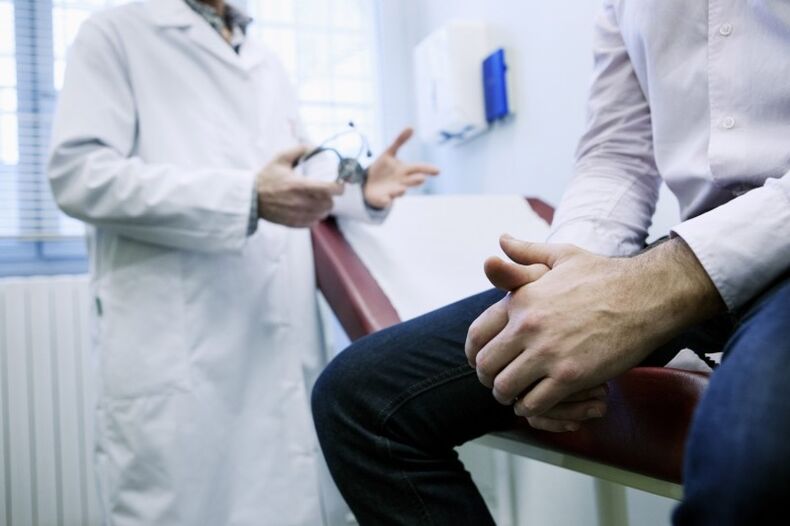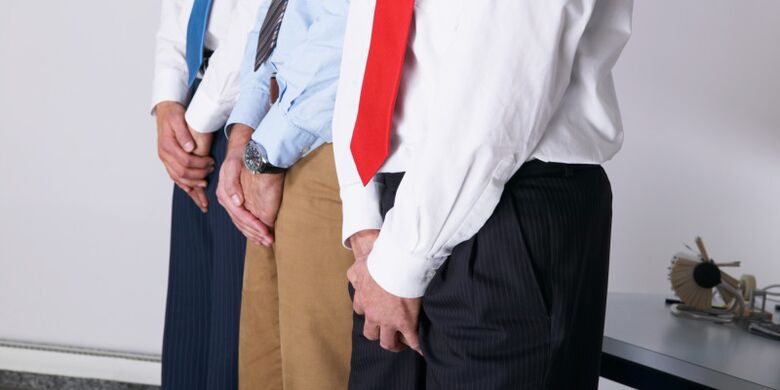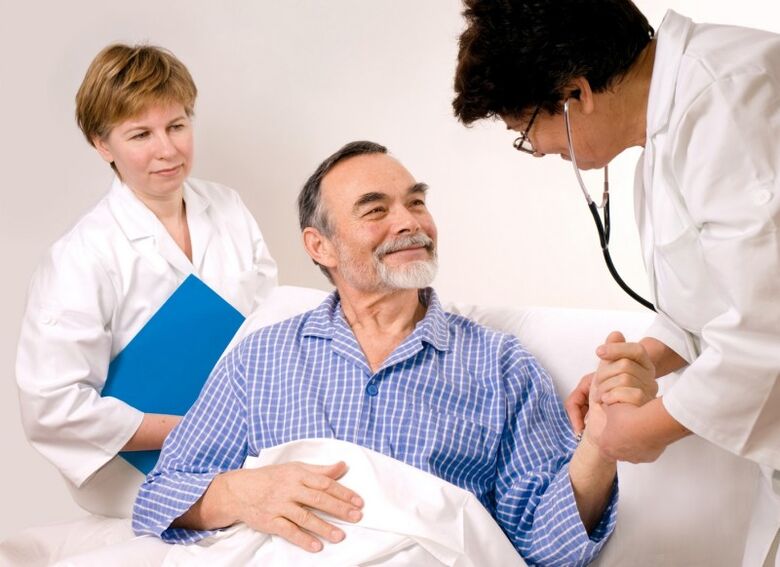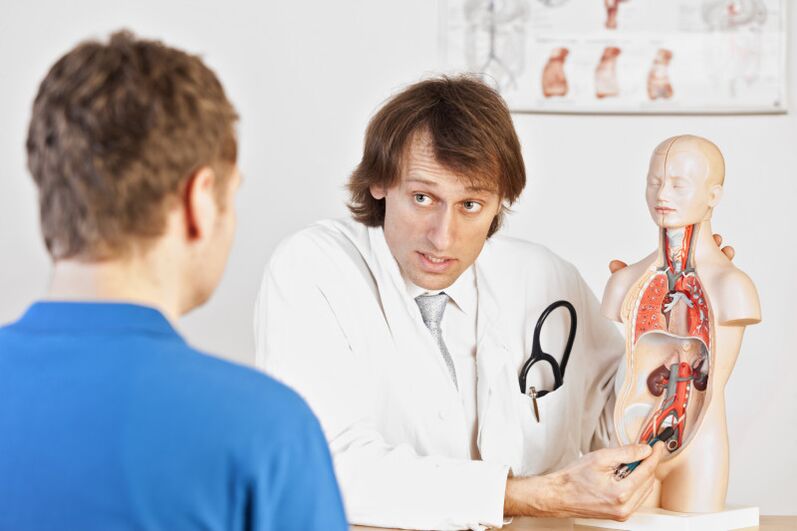
Prostatitis is a dangerous disease of the male genitals, which usually affects men under the age of forty. Although its symptoms - decreased sex drive, difficulty urinating, pain in the groin area - are painful, men are in no hurry to seek medical help.
And the reason for this is that there is not enough information about this disease, there are too many myths and stereotypes about it.
However, the symptoms of prostatitis only get worse with time, so at the first signs of prostatitis, it is urgent to contact a urologist with expertise in prostatitis. subject.
Causes of prostatitis
Prostatitis is an inflammation of the prostate gland. Doctors classify acute and chronic stages of the disease. If left untreated for the first time, the infection quickly becomes chronic and has many complications, such as impaired sexual function and even development of a malignant tumor of the prostate gland.
What are the reasons for its appearance?
Here are just a few of them:
- Sexually transmitted diseases. Often men are carriers of a specific infection without even knowing it because the disease is completely asymptomatic. However, this picture is very misleading. For example, as soon as the immune system is weakened, under the influence of a stressful situation, this promotes the development of prostatitis. The most common pathogens are herpes viruses, fungi of the genus Candida, Escherichia coli, etc. v.
- Untreated bladder infection. In this case, the infection easily spreads to the nearby prostate gland.
- Blood stagnation in the pelvic region. This can lead to a sedentary lifestyle and an irregular sex life. In this case, there is a so-called nonbacterial prostatitis.
- Frequent hypothermia, stress, the presence of foci of infection, including caries, in the body.
- Prostatitis can develop as a complication after severe infectious diseases - flu, tonsillitis and others.
The main symptoms of prostatitis
The most common signs of this disease, regardless of its cause, include:
- reduced potency;
- pain and difficulty urinating;
- pain of varying severity in the groin and genital area.
Symptoms of acute bacterial prostatitis
As noted above, the initial stage of bacterial prostatitis is acute, lasting no more than 3-5 days, and then slowly turns chronic.
It is very important not to miss the first symptoms of the disease:
- Pain in the groin and scrotum;
- Pain when urinating;
- Pain after intercourse at the glans of the penis;
- Decreased erection ability, reduced intercourse time.

A few days after the first symptoms appear, the pain subsides, men get the false impression that the threat has passed. However, this only means that prostatitis slowly but surely becomes chronic.
Such a course of the disease is characterized by:
- Alternating periods of remission and exacerbations of prostatitis;
- Difficulty urinating, frequent urge to urinate, feeling that the bladder is not completely empty are the above signs of the disease.
During the exacerbation of chronic bacterial prostatitis, the patient presents with symptoms similar to those in the acute form.
Even seemingly innocuous factors can provoke it:
- Hypothermia;
- Cold;
- An erection without recognition;
- Avitaminosis;
- Stress and overwork;
- Sedentary lifestyle;
- constipation;
- Irregular sex life;
- Tobacco and alcohol abuse.
Symptoms of Non-Bacterial Prostatitis
This disease is also known as congestive prostatitis. This is the most common and dangerous disease. Its development is directly related to the way of life of modern people.
Medical researchers compare chronic prostatitis in severity and prevalence with dangerous diseases like tuberculosis or cancer, because its neglected form is a direct pathway toto prostate cancer.
This form of the disease can be discussed when prostatitis is not caused by any microorganism but is caused by other factors - long time not having sex, sedentary lifestyle, stress often. often.
Such a conclusion can be drawn from the results of a bacteriological study, which showed no pathogenic microorganisms.
Symptoms of this form of the disease are slightly different from those of bacteria:
- The patient complains of cyclical or constant dull pain in the pelvis, lower abdomen, groin, and genitals;
- Sexual dysfunction and problems with urination;
- Patient's depressed mental state
Symptoms of asymptomatic chronic prostatitis

This is a latent form of the disease. As the name implies, it is asymptomatic, that is, there is an inflammatory process in the prostate gland, but this does not affect the patient's condition.
Some researchers from medicine are inclined to consider this form of pathology only as normal age-related changes in the prostate gland, which occur as a result of a decrease in the blood supply to this organ.
This disease is often discovered in a patient quite incidentally, for example, during a laparotomy combined with a completely different diagnosis.
To avoid prostatitis, you need to know its causes.
So, the main measures to prevent prostatitis:
- Although the main measures to prevent prostatitis, as has been mentioned many times, include regular sexual activity, casual sex should be avoided or forced to use other methods. contraception. This measure is mandatory, since about 30% of prostatitis cases are associated with sexually transmitted diseases.Substitute sexMasturbation is also welcomed by urologists because no less than a full-fledged sex act improves the blood supply to the prostate gland.
- Physical activity, active lifestyle. Exercise and sports are useful as a means of promoting general health, but the focus should be on exercises that improve blood circulation in the pelvic area. These include running, skating, skiing, and more. v.
- Regular preventive check-ups by a urologist or urologist, at least once a year.
- Timely treatment of foci of infection in the body, for example, oral hygiene.
Diagnosis of prostatitis is complex and multifaceted

Diagnosis of prostatitis mainly involves determining the cause of the disease, it includes the following steps:
- It is important to clarify the picture of the disease is a survey of the patient, who must describe in detail his complaints - the localization of certain sensations, their duration, eventsto which the manifestations relate, then they begin. At the same time, at the appointment, the doctor carefully examines the patient's medical record for previously transferred diseases, tests and checks. The urologist clarifies the patient's information about the sex life, the presence of sexually transmitted diseases.
- Check for a smear and scrape from the urethra. An increase in the number of white blood cells in the smear and the presence of pathological microorganisms in the scraping will indicate the presence of infection.
- Urine analysis. Helps determine the presence of infection, the presence of which is indicated by an increased white blood cell count (more than 5).
- Ejaculation analysis. Performed to confirm the diagnosis of nonbacterial prostatitis.
- Prostate ultrasound. Allows you to view the image of the disease to the fullest. It is performed to clarify the diagnosis in both acute and chronic inflammation of the prostate gland, suspected of having cancer.
Pain and decreased potency - is the first sign of prostatitis
Usually, doctors have to deal with an advanced form of the disease, as most men tend to ignore the first alarm bells - pain in the groin and decreased sex drive, or the disease itself. no symptoms for a certain period of time.
These are the features of the male anatomy - in the prostate area, blood circulation is difficult, a "nutritional environment" for the reproduction of pathogenic microorganisms, a sedentary lifestyle aggravatesadd this problem. So the reason for the massive spread of prostatitis among truck drivers and office workers became clear.
In one way or another, up to 50% of all men globally have experienced certain symptoms of prostatitis. Therefore, it is important to know the first signs of the disease and seek medical attention promptly. After all, treating an advanced form of the disease is an expensive and lengthy undertaking.
Treatment helps the patient return to a full life

Of course, it is much easier to recover from prostatitis in the early stages than it is to ignore the disease. However, it is the chronic form that doctors most often deal with, and it often requires a long and complex treatment.
But in any case, you first need to determine the root cause of the pathology - stagnation of blood and (or) inflammation in the prostate gland.
So, complex treatment of prostatitis includes:
- Inflammatory processes are treated with broad-spectrum antibiotics. Moreover, the drugs are prescribed both in the form of tablets and in the form of rectal suppositories. In the complex, the infusion of medicinal herbs (chamomile, calendula), which is used in the form of micromolecules, has a beneficial effect.
- However, the treatment of prostatitis should not be limited to medication alone, but should be directed at restoring blood circulation in the prostate area, and this includes physical therapy exercises andtherapy. Such measures contribute to better absorption of antibacterial drugs, as they improve the blood supply to the prostate gland. Doctors usually prescribe for prostatitis: electrophoresis, laser therapy, acupuncture;
- Prostate massage. This procedure is useful and effective, but should not be performed at home without consulting a doctor because it has many contraindications, including the acute phase of the disease.
In summary, it can be said that the treatment and prevention of prostatitis largely depends on the wishes and activities of the man himself. Basic exercises in the morning, regular preventive check-ups by a urologist, a balanced diet - these are the keys to men's strength and longevity!



























